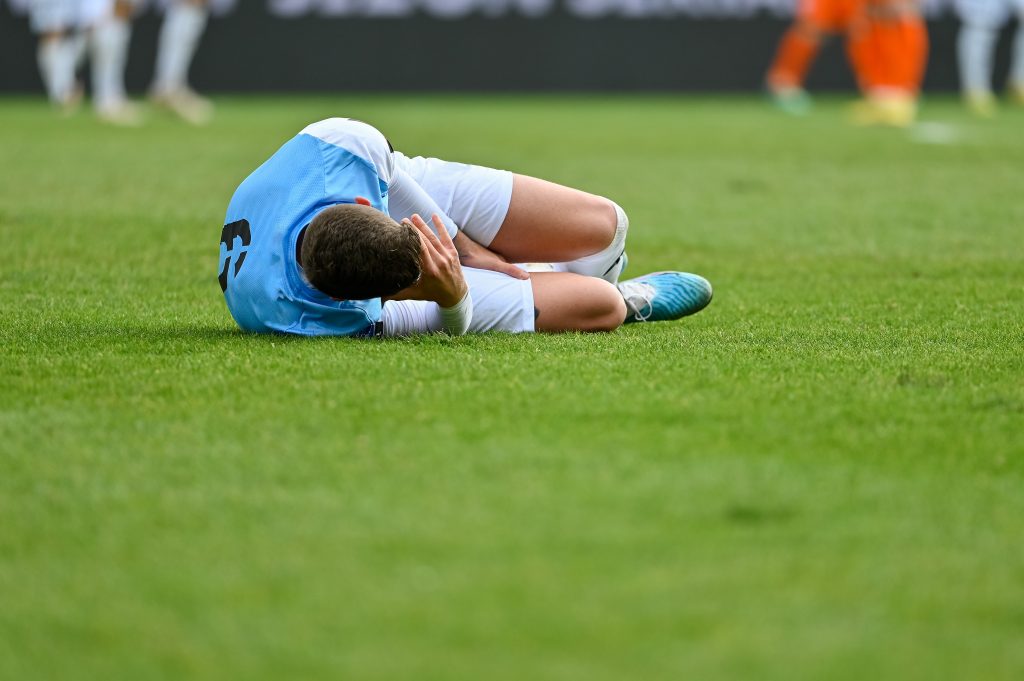If you’re a contact-sport athlete, you know that hard knocks come with the territory. Whether you’re on the football field, the hockey rink, or the soccer pitch, hits are part of the game. But when you feel disoriented, dizzy, or unusually fatigued after a bad hit, it’s important to let your trainer or coach know right away.
And concussions aren’t just an athlete’s problem. Head injuries happen every day, including from slips, falls, car accidents, or an unintentional bump to the head. No matter how or where it happens, head injuries are serious and should never be ignored. If left untreated, they can lead to persistent health issues.
Symptoms of concussion
In the aftermath of a head impact, there are a lot of symptoms you can expect that may or may not indicate a concussion, like:
- Headache, pain, or pressure in the head
- Dizziness or loss of balance
- Confusion or a “foggy” feeling
- Nausea or vomiting
- Sensitivity to light or noise
- Blurred or double vision
- Fatigue or drowsiness
- Difficulty concentrating or remembering
- Mood changes, including irritability, sadness, or anxiety
- Loss of consciousness (even briefly)
Some symptoms, such as headaches and dizziness, are immediate, while others (like confusion or mood changes) might take time to develop.
Post-concussion syndrome (PCS)
Some people experience lasting side effects even after the surface-level bruise or welt from a head injury has healed. In some cases, new symptoms arise days or weeks after the injury, or immediate symptoms simply linger for longer than expected.
These symptoms can include:
- Chronic headaches
- Sleep disturbances
- Difficulty focusing or performing everyday tasks
- Prolonged sensitivity to lights and sounds
- Emotional dysregulation, including increased anxiety and irritability
Some medical professionals are starting to use the term persistent post-concussive symptoms (PPCS) to describe this condition, rather than post-concussion syndrome, as the term “syndrome” incorrectly implies the cause is not well-defined.
Early intervention with physical therapy can make a significant difference in addressing these longer-term challenges.
Treatments for concussions and related symptoms
Unlike a broken bone, a concussion won’t be healed with something as straightforward as a cast. It takes time, careful attention to symptoms, and often multiple types of therapy to regain function and heal after head trauma.
Because of the many different factors that may be at play with your specific injury and symptoms, it’s always best to seek care from a licensed physical therapist when you think you have a concussion. They will make a careful evaluation and create a personalized treatment plan that’s tailored to your needs.
Not every treatment method is appropriate for any every head injury or person, but a treatment plan may include some combination of the following:
- Rest and recovery: Physical and mental rest are essential in the initial recovery period. This might mean taking time off from sports, work, or other activities.
- Gradual return to activity: Once symptoms begin to subside, gradually reintegrate cognitive and physical tasks under the guidance of a medical professional to avoid overexertion while restoring function.
- Vestibular therapy: For balance or dizziness issues.
- Vision therapy: To address blurred or double vision.
- Cognitive behavioral therapy (CBT): To help with mood changes or emotional symptoms.
- Medication (if necessary): While there are no specific “cures” for concussions, medications may be prescribed to alleviate headaches, sleep issues, or mood imbalances.
- Monitoring and professional guidance: Recovery is not one-size-fits-all. Regular check-ins with medical professionals, including neurologists, physical therapists, or psychiatrists, ensure that any lingering issues are addressed.
Find physical therapist for concussion in St. Louis
If you or someone you know is dealing with a possible concussion, it’s time to take proactive steps toward recovery. At Excel Sports & Physical Therapy, we specialize in helping athletes of all ages recover from sports-related injuries, including concussions. Our physical therapists and athletic trainers work with expert care and attention to support you in every aspect of your rehabilitation.
When it comes to head injuries, early intervention is the key for long-term success. Call an Excel clinic near you for the fastest appointment times.
